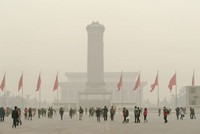Advertisement
Grab your lab coat. Let's get started
Welcome!
Welcome!
Create an account below to get 6 C&EN articles per month, receive newsletters and more - all free.
It seems this is your first time logging in online. Please enter the following information to continue.
As an ACS member you automatically get access to this site. All we need is few more details to create your reading experience.
Not you? Sign in with a different account.
Not you? Sign in with a different account.
ERROR 1
ERROR 1
ERROR 2
ERROR 2
ERROR 2
ERROR 2
ERROR 2
Password and Confirm password must match.
If you have an ACS member number, please enter it here so we can link this account to your membership. (optional)
ERROR 2
ACS values your privacy. By submitting your information, you are gaining access to C&EN and subscribing to our weekly newsletter. We use the information you provide to make your reading experience better, and we will never sell your data to third party members.
Pollution
Changing diets have worsened China’s air quality
Increasing meat consumption since 1980 contributes to premature mortality from air pollution
by Katherine Bourzac
December 13, 2019

As China’s economy has grown, so has the country’s appetite for meat. On Dec. 10 at the American Geophysical Union Fall Meeting in San Francisco, researchers presented evidence for a surprising indirect effect of increased meat consumption: premature deaths linked to increased air pollution.
In the 1960s, most people in China ate plant-based diets; now, they consume more meat than is recommended by health experts. Those experts base their recommendations on well-known health effects of excess red meat consumption, such as increased risk of heart disease. If people followed the country’s recommended meat consumption guidelines going forward, it would prevent about 70,000 premature annual deaths that are caused by air pollution, says Amos P. K. Tai, an atmospheric scientist at the Chinese University of Hong Kong, who led the research. That’s fewer than would be prevented if people in China returned to their earlier, more plant-based diets of previous decades, but still a significant benefit, Tai says.
Most research on dietary change and emissions focuses on the potential to mitigate greenhouse gases, Tai says. For example, adopting a plant-based diet can lead to lower methane emissions. Tai wondered whether dietary changes could have other environmental health consequences.
His group and colleagues at Peking University examined the link between increased meat consumption and premature mortality attributed to fine particulate matter, a kind of air pollution that can lead to heart and lung disease, among other health effects. Exposure to fine particles 2.5 µm and smaller, called PM2.5, led to an estimated 1.8 million premature deaths in China in 2010. About 10% of these deaths were likely caused by the dietary shift to increased meat consumption in the country from 1980 to 2010, Tai says.
The link is fertilizer, Tai explains. The more meat people in a country eat, the more feed crops farmers need to grow—and the more nitrogen fertilizer they use. Modern farmers tend to apply more fertilizer than their plants need. This excess drives ammonia emissions into the atmosphere, where some of that ammonia aggregates and forms PM2.5.
To figure out how increased meat consumption has affected air quality, Tai collaborated with nutrition researchers to estimate meat consumption. His team combined those estimates with ammonia emissions data, plugging the information into an atmospheric model to predict PM2.5 levels. Finally, they used those levels to estimate air-pollution-related deaths.
Ammonia emissions from fertilizer use in China doubled from 1980 to 2010, Tai says. According to his research, about 63% of the increase can be attributed to feed-crop production driven by the country’s rising meat consumption. As a result of this increased meat demand, by 2010, the team calculates, the country emitted an additional 4 trillion grams of ammonia. This in turn produced an additional 10 µm of PM2.5 per m3 of air on average.
“Dietary changes can cause pollution that affects people’s health directly,” Tai says. “It’s not only about climate change.”
Tying pollution-related deaths to meat consumption rather than production more broadly can be a bit “sticky” economically but probably holds true for China, says Matthew Hayek, who studies the environmental impacts of diet and land use at New York University. Hayek expects dietary changes are likely to have similar indirect health effects in other countries that consume and produce large amounts of meat per capita, particularly the United States and Brazil.




Join the conversation
Contact the reporter
Submit a Letter to the Editor for publication
Engage with us on Twitter